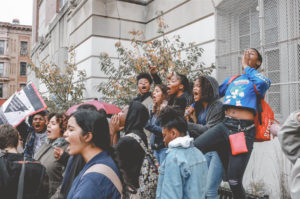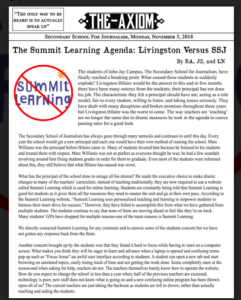If you’d like to add your voice and urge the mayor and Chancellor to stop robbing children of their privacy and stop encouraging charter schools to recruit more students and thereby defund public schools, send a letter by clicking here.
Last week, in a mindboggling audit, the Inspector General of the US Department of Education revealed that the US Department of Education had utterly failed to respond in a timely fashion to complaints filed by parents about the violation of their children’s privacy by their schools or districts.
“The Privacy Office is not meeting its statutory obligation to appropriately enforce FERPA and resolve FERPA complaints,” the Inspector General concluded. “Complainants’ privacy rights are also not appropriately protected as FERPA intends.”
In some cases, as the audit reveals, it took up to six years for the Family Policy Compliance Office (FPCO) of the US Dept of Education to respond to FERPA complaints. Because the office hasn’t kept a systematic record of when complaints were filed and then resolved, it was difficult for the auditor to even know what the average time before investigations were launched, close or responses sent. As of Sept. 2017, there were 285 open investigations.
As I was quoted in Edweek: “Parents have these very serious complaints about their kids’ privacy having been violated, and they go through the trouble of filing complaints, but they just sit for years without any kind of substantive response.”
To make things worse, when FPCO finally decides that the law has been broken, as they did with Agora charter school in Nov. 2017 , five years after the original complaint, they have never imposed any fines or withheld any funding. Years of delay and no punishment means yet more reasons for schools and districts to drag their feet and continue to violate the law.
Here in NYC, children have suffered as a result of these inordinate delays. In November 2017, Johanna Garcia filed a FERPA complaint about the practice of NYC DOE making her family’s personal information and that of other families available to charter schools for the purpose of letting them mail marketing materials and recruit more students. Four Council Members wrote a letter in support of Johanna’s complaint to the Mayor and Chancellor Carranza, urging them to halt this practice.
Johanna finally received a written response from the US DOE on September 25, 2018, nearly one year later, saying they had finally launched an investigation. Dale King of FPCO forwarded her a letter that he had sent DOE, which asked several piercing questions about their privacy practices and their rationale for allowing charter schools to access student personal information, while stating that there was a deadline of four weeks in which they would have to respond.
Yet DOE further delayed, and apparently sent their response a full month after the deadline, on or around November 26. Meanwhile, as I feared, charter schools have already begun to send out mailings, promoting their schools and urging parents to apply for next year.
On Twitter this morning, Naomi Pena, President of the Community Education Council in District 1, posted photos of the glossy brochures she just received in the mail from Success Academy charters, run by Eva Moskowitz, and the Hebrew Public (sic) Charter Schools, founded by Sara Berman, the daughter of billionaire Michael Steinhardt.
Naomi’s last tweet refers to the fact that the DOE makes elected Community Education Councils pay the Vanguard mailing house to send parents information about what’s happening in their districts — even though the DOE could provide parent emails for free. DOE could do this either under the directory information exception to FERPA, or the school officials exception. In the first case, DOE would have to allow parental opt out, in the second case, CECs would have to sign a written agreement that they would only use this contact information to increase parental involvement and promise not to redisclose the data to other entities.
CECs are eligible to be defined as school officials under FERPA as by encouraging parental engagement, they are truly providing a service to DOE – unlike charter schools, which are providing no services to DOE, making them ineligible to be defined as school officials under the law. CECs receive very little money from DOE and simply don’t have the budget to pay the thousands of dollars to Vanguard that wealthy charter school chains like Success and the Hebrew charter schools can afford.
If you’d like to add your voice and urge the mayor and Chancellor to stop robbing children of their privacy and stop encouraging charter schools to recruit more students and thereby defund public schools, send a letter by clicking here.
An even worse fate has been suffered by Fatima Geidi and her son because of the failure of the US Department of Education to carry out its responsibilities under the law. On October 30, 2015, more than three years ago, Fatima filed a FERPA complaint against Success Academy after she appeared on the PBS News Hour to discuss the abusive treatment that her son had experienced at a Success charter school. Eva Moskowitz took revenge against her, by posting her son’s disciplinary file online, full of false charges, and sending it to reporters throughout the nation.
After filing a complaint against this egregious violation of her son’s privacy, Fatima received no response from the US Department of Education until more than two years later, when she received a letter which said that they had initiated an investigation and had asked Success for an explanation. On February 16, 2018, they emailed her again to say that they had now received a response from Success and in a few weeks would let her know the results.
By that time, however, Eva Moskowitz had taken the initial posting of the child’s supposed disciplinary offenses down. But instead, she had since published the same chronicle of trumped-up allegations against him in a book published by Harper Collins on September 12, 2017. Fatima had informed the US Dept of Education of this fact as soon as she discovered it by filing yet another FERPA complaint on December 20, 2017, in which she cited her earlier complaint, and wrote that because of the delay the harm to her child ‘s privacy had been seriously aggravated.
Fatima has heard nothing more from the US Department of Education about either her initial or more recent FERPA complaint since February 2018. Eva Moskowitz’ book is still available online and in bookstores. Fatima is now in the process of changing her son’s name so that in the future, his opportunities will not be wrecked by the false allegations made against him, contained in the pages of this horrific book.
These are just two stories showing the immense price that NYC parents and their children have been forced to pay for the utter failure of the US Department of Education to carry out its responsibilities under the law. The personal information of children has been handed off by DOE like candy to charter schools to help them recruit more students, where these children can be further abused and their privacy even more seriously violated.
If you’d like to add your voice and urge the mayor and Chancellor to stop robbing children of their privacy and stop encouraging charter schools to recruit more students and thereby defund public schools, send a letter by clicking here.



